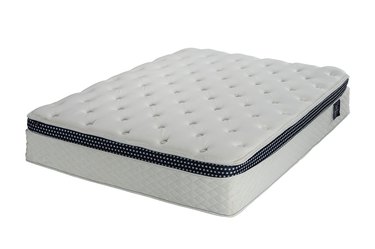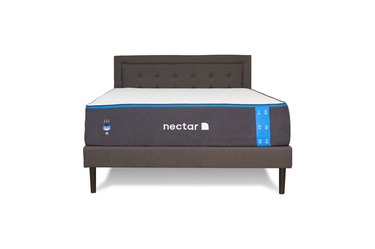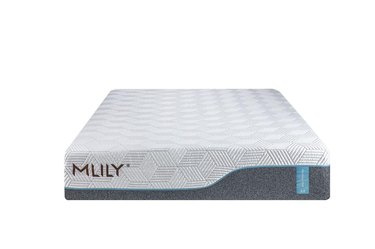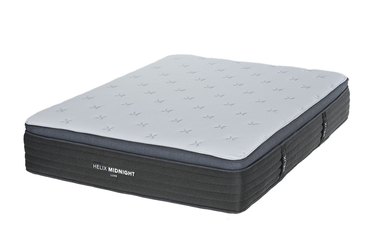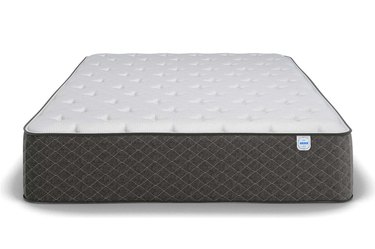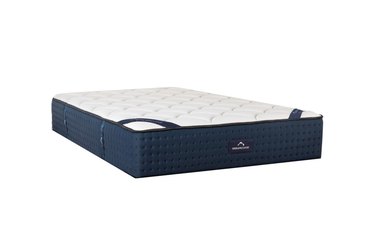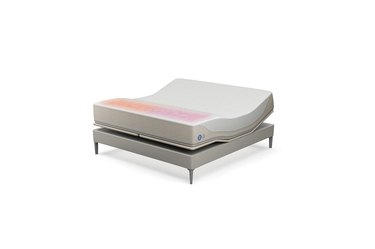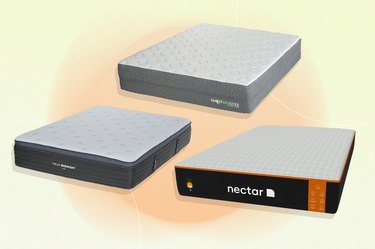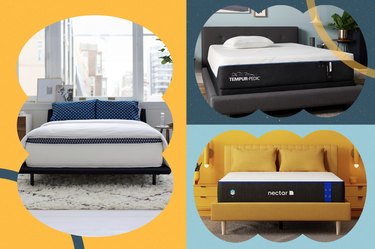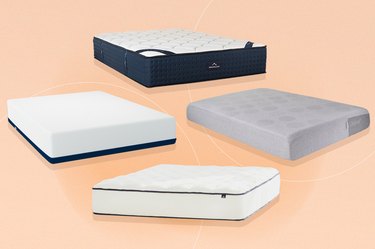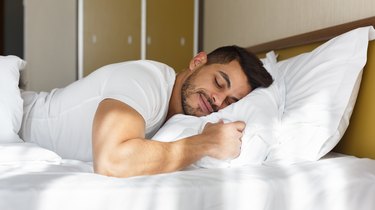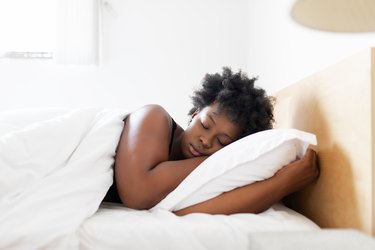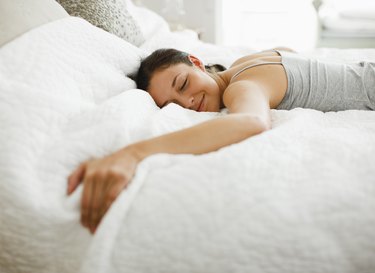
It's no secret that all adults should be aiming for seven to nine hours of sleep each night. But about a third of Americans have symptoms of insomnia, per the American Academy of Sleep Medicine (AASM), and for them, it can be extremely challenging to meet this goal.
Insomnia symptoms include difficulty falling or staying asleep, waking up too early and feeling tired during the day, according to the Mayo Clinic. Many of us experience these symptoms now and then, but as many as 10 percent of people have chronic insomnia diagnosed by a health care professional, per the AASM. And there's been an increase recently due to a condition dubbed coronasomnia, notes Allison Siebern, PhD, CBSM, who's board-certified in behavioral sleep medicine and Proper's head sleep science advisor.
Video of the Day
Video of the Day
While getting on a regular schedule can help reduce insomnia, so can the right bed. In fact, sleeping on the right mattress can make all the difference for someone with insomnia, helping them not only fall asleep faster, but stay asleep during the night, says Peter Polos, MD, PhD, sleep medicine specialist and Sleep Number sleep expert.
"Certain mattresses can help address your specific sleep challenges with features such as a temperature balancing surface to keep you at your perfect climate, pressure-relieving layers and support to ease discomfort, adjustable firmness and softness and the ability to raise and lower the head and foot of the bed to accommodate different sleeping positions and help relieve snoring," Dr. Polos says. "Some smart beds even provide data and insights into your sleep quality, biometrics like heart rate, HRV and breath rate, circadian rhythm and your overall sleep health."
With that in mind, we've rounded up the best mattresses to try if you're struggling with insomnia.
The Best Mattresses for Insomnia
- Best Overall: The Winkbed ($849 to $1,899, WinkBeds.com)
- Best on a Budget: Nectar Mattress ($499 to $1,199, NectarSleep.com)
- Best Splurge: MLILY Harmony Chill 3.0 ($2,299 to $3,999, MLILYUSA.com)
- Best for Stomach and Side Sleepers: Helix Midnight ($599 to $1,299, HelixSleep.com)
- Best for Back Sleepers: Bear Hybrid ($936 to $2,060, BearMattress.com)
- Best Foam: The DreamCloud ($699 to $1,199, DreamCloudSleep.com)
- Best Smart Mattress: SleepNumber 360 i8 Smart Bed ($2,749 to $4,999, SleepNumber.com)
How We Chose
We tapped five sleep experts, who shared their professional product recommendations and broke down what to look for in a mattress if you're struggling with either temporary or chronic insomnia. We selected these mattresses based on their criteria, including comfort, fit, durability, longevity, style and cost.
1. Best Overall: The WinkBed
If you snooze in a variety of positions and/or share your bed with a partner who sleeps in a different position from you, this is a great mattress for you. You can choose from four varying levels of firmness — softer, luxury firm, firmer and plus, which is designed for plus-size adults.
"The mattress is a hybrid mattress that features pocketed micro-coils that allow for airflow and keeps motion across the mattress low," explains Logan Foley, a certified sleep science coach with SleepFoundation.org. "It also features a tufted pillow-top to keep you supported and comfortable."
In other words, it keeps you cool and comfy, and you won't be jostled awake by a moving bed partner.
Another perk of this mattress is that it comes with a 120-night warranty, giving you plenty of time to see if it helps reduce your insomnia symptoms and score you more shut-eye in the meantime.
Buy it: WinkBeds.com; Price: $849 to $1,899
2. Best on a Budget: Nectar Mattress
This mattress has rave reviews not only for its three layers of memory foam that adapt to the spine, but also because of its affordable price point. A twin mattress starts at just $499, and the price only goes up incrementally at a reasonable rate from there.
"The Nectar is a medium-firm mattress, which provides the necessary support and reinforcement," says Jordan Duncan, DC, a chiropractor at Silverdale Sport & Spine in Silverdale, Washington. "This combination allows the Nectar to deliver the contouring of memory foam without the sagging, making it a great choice for those with symptoms that foster their insomnia, like lower back pain."
Buy it: NectarSleep.com; Price: $499 to $1,199
3. Best Splurge: MLILY Harmony Chill 3.0
If budget isn't an important factor in your decision, this mattress offers some impressive features that can help foster a healthier relationship with sleep for people with insomnia. It features layers of Gel AeroFusion Memory Foam that integrate cooling components, such as a cooling knit mattress cover that allows optimal airflow to reduce nighttime sweating.
MLILY also uses the highest-quality materials, including naturally antibacterial bamboo charcoal, and an optimal structure for musculoskeletal comfort and support for varying sleeping positions, adds Robin Thorpe, PhD, CSCS, sleep scientist and MLILY USA brand ambassador.
Buy it: MLILYUSA.com; Price: $2,499 to $3,999
4. Best for Stomach and Side Sleepers: Helix Midnight
Helix offers many models, but the Midnight offers the most support for people who like to sleep on their stomach. It has a medium level of firmness, so it's not too flat for those who like to sleep face-down, but also doesn't sink in and cause back pain. It's also great for side sleepers because it provides pressure-point relief for the hips and shoulders.
The mattress cover that it comes with is highly breathable, which improves airflow and keeps your body at the right temperature through the night.
Buy it: HelixSleep.com; Price: $599 to $1,299
5. Best for Back Sleepers: Bear Hybrid
If you prefer to feel like you're sleeping on top of your mattress rather than in it, Foley recommends a hybrid mattress like this one from Bear. "Hybrids are also a better choice for folks who have mobility issues, as memory foam can be tough to move in," she says.
Bear offers four times more pressure relief than most mattresses on the market, along with innerspring coils that help keep you cool throughout the night by promoting air circulation.
Those with an eye on the environment will appreciate that this is GREENGUARD Gold Certified for low emissions and meets third-party stands for chemical exposure, such as volatile organic compounds (VOCs) and phthalates.
Buy it: BearMattress.com; Price: $936 to $2,060
6. Best Foam: The DreamCloud
This memory foam mattress has five layers, each with their own set of features to help you sleep through the night. The fifth and deepest layer features supportive coils that adapt to your body over time to provide a personalized feel. The fourth layer is an essential base layer to keep everything above and below in working order. The third layer offers hybrid features, ensuring you don't sink into the mattress and that you have just the right amount of firmness and support. The second layer is pressure-relieving, as it is made of gel memory foam and contours to your shape. The top layer is the softest, because it's the one your body touches. It's made of quilted foam and cashmere.
This mattress also has Zero Gravity Settings that simulate the sleep position NASA scientists discovered was most ideal for astronauts heading into space.
Buy it: DreamCloudSleep.com; Price: $699 to $1,199
7. Best Smart Mattress: Sleep Number 360 i8 Smart Bed
People with insomnia can benefit from a mattress with a host of features, especially one that offers both cooling technology and pressure relief along with an operating system that literally keeps track of your sleep quality.
"This mattress has SleepIQ technology, an operating system that is embedded into every 360 smart bed to measure sleep time, restful and restless sleep, heart rate and respiratory rate," explains Dr. Polos. "It gathers billions of longitudinal biometric and sleep data points from millions of real-world sleepers and shows sleep quality via a daily SleepIQ score, with personal insights for better sleep."
This mattress also has responsive air technology to keep sleepers at the perfect temperature throughout the night and prevent night sweats that can wake you. The base is adjustable and can be customized for each side to accommodate both sleeping partners.
Buy it: SleepNumber.com; Price: $2,749 to $4,999
What to Consider Before Buying a Mattress to Help With Insomnia
Keep these things in mind when shopping for a new mattress to help with your insomnia:
1. Sleep Position
Dr. Polos recommends taking into account your sleeping position — whether you sleep on your back, side or stomach.
"If you sleep on your back, pick a bed that 'fills in' to support the small of your back and aligns your spine, and if you sleep on your side, pick a bed that 'fills in' to support the curves of your side so you feel cradled with pressure relief in the shoulders and the hips," he says. "In general, side sleepers will feel most comfortable with a softer mattress, while back and stomach sleepers will prefer a firmer mattress."
Related Reading
2. Comfort
No matter your sleep position, comfort is key when it comes to selecting a mattress. After all, we spend nearly half our lives in bed, per a survey by Slumber Cloud, and we should spend this time in comfort.
"Consider, too, that what we need for comfort now may not be what is needed in the future, so the ability to adjust firmness is very important," says Dr. Polos. "Age, injury, childbearing and other aspects of life can affect what we need when we sleep, and having a bed that can tailor firmness to your needs is important."
3. Temperature Control
Because of the importance of room and body temperature to promote sleep, Dr. Polos recommends considering what options the mattress provides to control these elements. Keep in mind the sweet spot for temperature is about 65 degrees Fahrenheit, so the ideal mattress should not allow your body temperature to swing too far above or below that.
Is this an emergency? If you are experiencing serious medical symptoms, please see the National Library of Medicine’s list of signs you need emergency medical attention or call 911.
